As noted here previously, on May 30th the Times published an article by Jack Malvern about the promotional appearance the previous day of the BBC’s international editor Jeremy Bowen at the Hay literature festival.
In our earlier post we documented the failure of the Times to provide essential context concerning an incident that took place during Israel’s withdrawal from southern Lebanon twenty-three years ago which is described in the article as follows: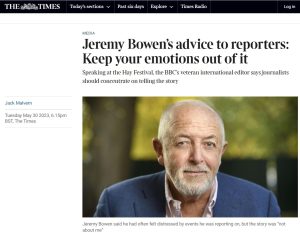
““It really gets my goat when there’s a story with a journalist talking about how they feel,” he [Bowen] told an audience at the Hay Festival of literature. “I don’t give a damn about how they feel.”
He said they should “explain the human challenges, what it’s like to be there, what it’s like to be the person who’s [sic] village has blown up. And at the same time I think you have to put in some context about why it’s happening.”
Bowen, 63, said that he had often felt distressed by events he reported on, including when he witnessed the death of Abed Takkoush, his driver, who was killed in south Lebanon when the Israeli army fired a tank shell into his car. The tank crew also tried to kill Bowen and his cameraman.” [emphasis added]
Seeing as Jeremy Bowen has repeatedly written and spoken about that incident (especially around its anniversary in late May), it is possible to look at the evolution of the claim that an Israeli tank crew “tried to kill Bowen and his cameraman”.
In October 2012 Bowen gave an interview to the Observer in which he described that incident as follows: [emphasis added]
“…in Lebanon [while covering the Israeli Defence Forces’ withdrawal from the country], my driver, Abed, was killed by Israeli fire. I’d been talking to my literary agent on the phone. I got out of the car. My driver was on the phone to his son. I walked away with my cameraman. There was a huge explosion. I looked round. The car was on fire. My driver was killed. […] I’m haunted by the fact that when Abed was killed, I didn’t run back to the car. The Israelis would have killed me too if I had. But I still feel I let him down.”
In May 2016 Bowen described the incident to BBC Radio 4 audiences as follows:
“My big mistake was deciding to stop to do a piece to camera near the Lebanese border with Israel. I didn’t think they’d shoot from the other side of the wire. I asked Abed to pull over. He stayed in the car making a phone call while the cameraman Malek Kenaan and I got out. A couple of minutes later an Israeli tank about a kilometer away on their side of the border fired a shell into the back of the car. Somehow Abed forced his way out of the window and then dropped down onto the road. Malek told me not to go up to the remains of the car, which was on fire, because Abed was dead and the Israelis would kill me too. A colleague on the Israeli side heard the tank crew saying they’d got one of us and they’d kill the other two with a heavy machine gun. When I stuck my head out of the place where Malek and I had taken cover, they opened fire as they said they would. I’m as certain as I can be that the Israelis would have tried to kill me too if I’d gone up to find him. But I still feel guilty that I didn’t.”
In May 2017 Bowen told the story to Radio 4 audiences once again, but with some variation:
“The big mistake I made was deciding to stop to do a piece to camera overlooking an Israeli village. I discovered later that journalists and Israeli civilians were watching from a picnic spot as I got out of the car with Malik. I thought we were safe where we were but I didn’t realise that an Israeli battle tank had us in its sights.” […]
“I said to Malik ‘let’s get up there to help him’. Malik’s face was contorted. ‘No’, he said, ‘don’t do it. Abed is dead; he can’t have survived that and if you go up there too, they’ll kill you’. When cautiously I moved towards Abed’s body I heard bullets fizzing over my head and ducked back into cover. A team from the Times later said they heard the tank crew saying on the radio that they’d get the other two with the heavy machine gun. I’ll feel guilty till my last day that we stopped to film there.”
In February 2018 Bowen gave the following account to listeners to BBC Radio 5 live:
“But a couple of minutes after I got out with Malek there was a bright – you know, early summer day – there was a huge explosion and I turned round. And it was filmed because we were trying to do the piece to camera at the time it was…and there was a big explosion behind me and then I could see…he leapt out through the window – not leapt: he managed to force his body out –I mean he was on fire. And I said to Malek ‘come on, let’s get up there’ and he said ‘no, no; don’t go up there Jeremy because believe you me he’s dead. He may have had the strength to get out but he’ll be dead now and if you move up there they’ll kill you too’. And eventually I did try and move up there, they opened up in our direction with a heavy machine gun from the tank and a colleague from the Times, his driver had heard the radio traffic in Hebrew and they had said ‘we’ve got one, we’ll get the other two with a heavy machine gun’. So I know that if I’d gone up there I’d have been killed or badly hurt but I still feel bad that, you know, I didn’t have a Hollywood ending, you know, or rather he couldn’t.”
In January 2020 Radio 4 listeners heard the following:
“…a Lebanese colleague of mine was killed by the Israelis. They fired a tank shell into the back of his car. I’d just got out. I was only about 100 yards away. He managed to force his way out through the window before he died. He was on fire. I couldn’t get up there. When I tried to get up there the Israelis tried to kill me. They opened fire on me with a heavy machine gun.”
In May 2022 Bowen Tweeted:
“On this day in 2000 Abed Takkoush, long time driver/producer for the BBC in Lebanon, was killed by a shell fired at 1km range by an Israeli tank crew. They tried to kill cameraman Malek Kanaan and me with the tank’s heavy machine gun. Their excuse – we might have been terrorists”
As we see, in the space of just over a decade Bowen’s account has evolved from “I didn’t run back to the car. The Israelis would have killed me too if I had” to “They tried to kill cameraman Malek Kanaan and me”. While the claim that Israeli troops opened fire with a machine gun is absent from his 2012 account (as well as from BBC reporting on the incident in May 2000), it appears in later ones with descriptions of the circumstances differing between “I stuck my head out” and “cautiously I moved towards Abed’s body”.
The Times’ failure to provide any explanation of the background to that incident is clearly all the more relevant given Bowen’s varying accounts of it over time.
The Times article also relates to an interview with Bashar al Assad conducted by Bowen in February 2015:
“Bowen also described how the Syrian regime tried to use seduction to gain control over an interview he did with President Assad.
He recalled that Assad’s handler, “an attractive woman”, told him the day before the interview: “Just one thing, Jeremy, I’d like to be in the edit room when you’re cutting it to help you.”
Bowen responded: “That’s immensely generous of you, but I will have no credibility whatsoever if you’re there.”
He told the literary festival audience: “She leant over and squeezed my knee and said: ‘It’ll be our secret. Then we’ll have dinner’.”
He rebuffed her advances. “I said: ‘Tempting though that would be, no thank you.’” The handler declared that in that case, there would be no interview. Bowen said that he almost vomited but held his nerve. The interview went ahead.
“So we called their bluff, basically. Assad was expecting to be interviewed the next day and she didn’t want to say [to him]: ‘We couldn’t get a deal.’”
In the interview, Assad gave softly spoken denials about using barrel bombs, which Bowen had seen being used in civilian areas to kill indiscriminately.
Bowen acknowledged criticism for giving Assad a platform but said it was worth it to confront him with awkward questions.
“He stuck to his guns, he made stupid jokes . . . For him the important thing was getting his message out, for me it was to challenge his message.””
Readers may recall that at the time, Bowen himself Tweeted a rather different portrayal of the Syrian regime’s cooperation with that interview:
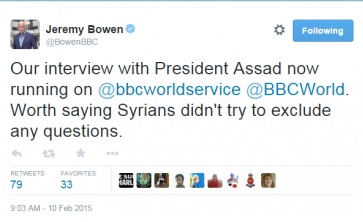
As was noted here in 2015, very little in the way of “awkward questions” and “challenge” was evident in that widely promoted interview:
BBC’S ASSAD INTERVIEW AND THE ‘RELATED ARTICLES’
Over the past twenty-three years Jeremy Bowen’s accounts of the tragic incident in southern Lebanon have been repeatedly and unquestioningly promoted by the BBC and additional media outlets, notwithstanding his refusal to acknowledge the fact that three men travelling in a war zone in a car with Lebanese plates and carrying camera equipment could be mistaken for Hizballah terrorists dressed – as was very often the case – in civilian clothing.
Malvern’s uncritical reporting of stories told by Bowen while promoting his book at a literary festival once again provides a friendly platform for that context-free narrative.

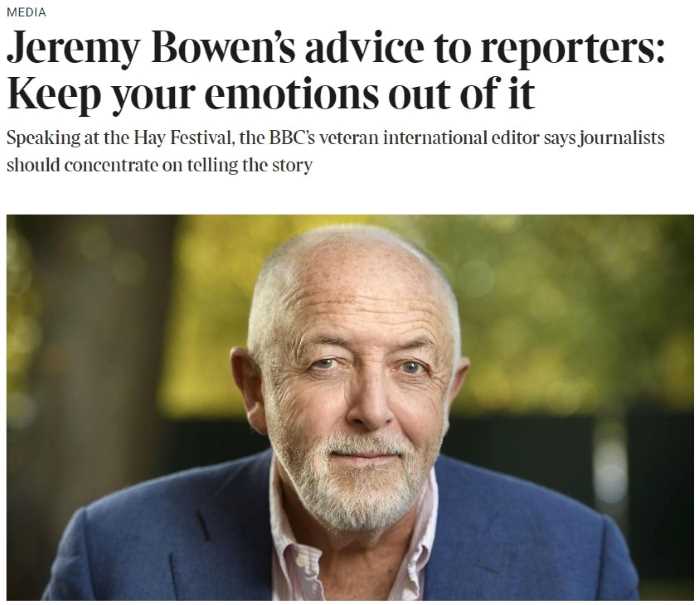

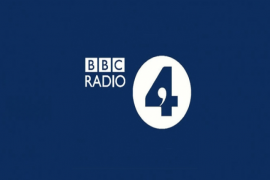
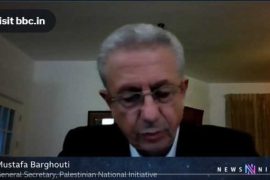

Bowen produces fiction to be in keeping with his anti Israel views. When Netanyahu was in London many years ago stating in Grosvenor House in Park Lane, Bowen was permitted an interview – on leaving he was questioned by about his views – response was” how can you challenge a correspondent of my standing” and off he went with a copy of the Guardian under his arm!
In the last five years when he attended a briefing in the Prime Minister of Israel’s briefing room he stayed behind in a virtually empty hall and then castigated the Prime Minister’s statement and answer to questions- he could have had the decency to do it in another location as he would have done, say with Assad.
Such is Bowen the Arab lover